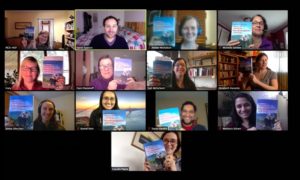
Topic-Specific Two-Hour Workshop Options
Completely new to climate justice and want to get your feet wet? Not new to the topic, but want to delve into a specific aspect of climate justice? If you answered yes to either of these questions, one or more two-hour climate justice workshops this Winter quarter may be for you! Climate justice is a multifaceted, dynamic, and evolving societal issue and each workshop features a different aspect of climate justice.
During the first hour of each workshop, gather information from a presentation of a climate justice topic by a BC faculty expert. For the second hour, participate in a semi-structured group brainstorming activity aimed at generating ideas for how you can integrate climate justice into your courses. You will leave the workshop with an outline of a climate justice lesson for one of your courses and afterwards post a description of your lesson outline on a Canvas site to share with other participants in our workshop series.
11:30 a.m.– 1:30 p.m. on select Fridays (see below for each workshop date)
4 PD hours and $150 stipend per session | 20 seats per workshop
Questions about any of these sessions? Please contact Sonya Doucette, Environmental Chemistry.
Workshop 1 – January 15: How serious is climate disruption and how is it impacting people around the world today? Extreme heatwaves, droughts and floods, wildfires, hurricanes, and other climate-related events are accelerating at a truly alarming rate, even over just the past few years. This environmental form of “slow violence” disproportionately affects vulnerable people around the world. Ensuring a just future will require swift systemic change. This workshop will offer an introduction and overview of climate justice through a “rapid-fire” one-per-slide presentation highlighting dozens of recent case studies of climate injustice happening around the world today while focusing on three key questions: Must we change? Can we change? Will we change?
Presenter: Sonya Doucette (Environmental Chemistry)
Register here to learn more about Climate Disruption.
Workshop 2 – January 29: What is the Paris Climate Accord and why is it important for the U.S. to rejoin?
One outcome of this year’s presidential election is that the U.S. will rejoin the Paris Climate Accord. But, what makes the Paris Agreement important? What’s actually in the agreement? Does it ensure environmental justice for nations that contribute little to the causes of global warming, but face significant consequences from climate disruption? This workshop will offer foundational material on international climate agreements and explore the most significant elements of the Paris Climate Accord. Whether you’re an international affairs policy wonk or just passionate about climate justice, this workshop is for everyone!
Presenters: David Spataro and Christina Sciabarra, Political Science
Register here to learn more about the Paris Climate Accord
Workshop 3 – February 12: What are the economic foundations for the Green New Deal, and what are the possibilities for achieving it?
The Green New Deal is a congressional resolution to mobilize every aspect of American society to 100% clean and renewable energy, guarantee living-wage jobs for anyone who needs one, and a just transition for both workers and frontline communities—all in the next 10 years. While dramatically disrupting the economy to address the climate crisis, the Green New Deal seeks to improve the economy by reducing racial and economic inequality and by investing in public resources.
Presenter: Tyler Saxon (Economics)
Curious about the Green New Deal? To learn more, register today!
Workshop 4 – February 26: You have the right to remain informed. What is Green Criminology and why is it gaining in popularity?
Green Criminology is a branch of Criminology that focuses on environmental harm and crimes, ecological justice, and the intersection between criminality and the law. This workshop will explore crime causality as it relates to crimes against nature, the evolution of crime fighting strategies used to investigate and prosecute ecological crimes, and eco-philosophical approaches to working with offenders convicted of crimes against the environment. Green Criminology is critical for the survival of our planet and its concepts are applicable to a wide array of disciplines. Upon conclusion of this workshop, you will be paroled with new knowledge, insight, and teaching strategies to help promote ecological justice.
Presenter: Kelli Callahan (Criminal Justice and Psychology)
To learn more about Green Criminology, register here!
Workshop 5 – March 5: What are the intersections between climate justice and human health?
This workshop will offer an overview of the Center for Disease Control (CDC) Climate and Health Program, Social Determinants of Health, and the connections to the United Nations Sustainable Development Goals. Teaching strategies implemented in nursing curriculum will be shared. The intersection between climate justice and human health can be integrated into disciplines beyond nursing, so join us if you want to explore a fit for your course!
Presenter: Teaessa Chism (Nursing)
Register to learn more about intersections between climate justice and human health.
Last Updated March 5, 2021
